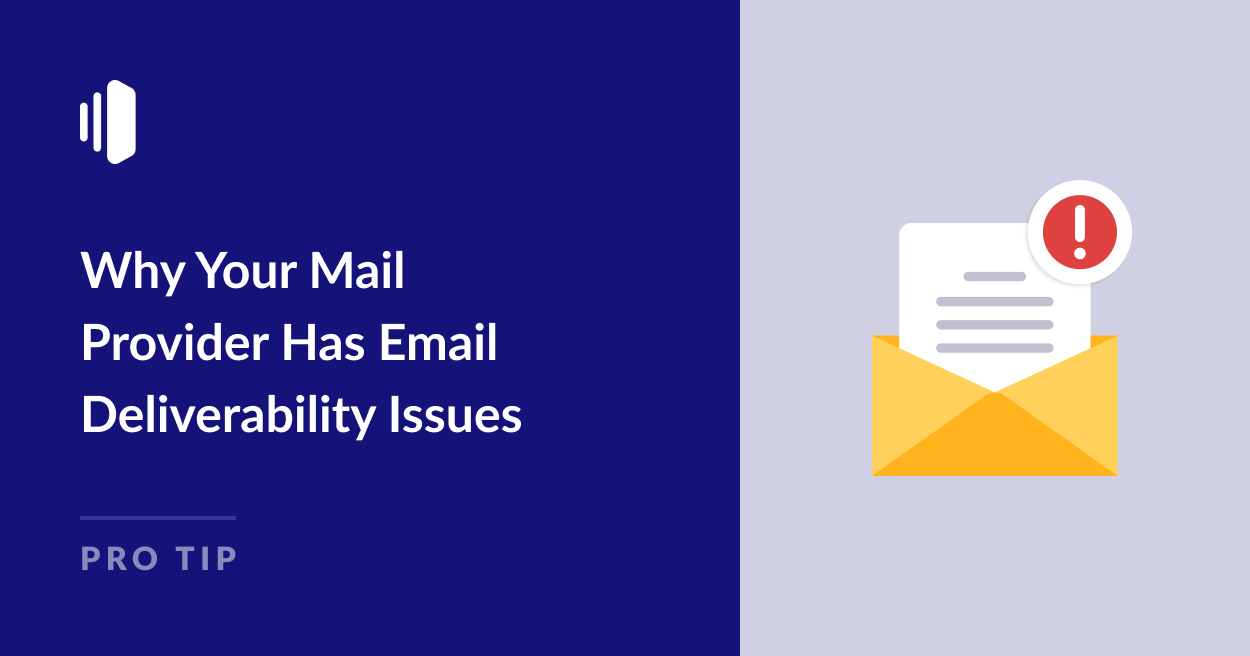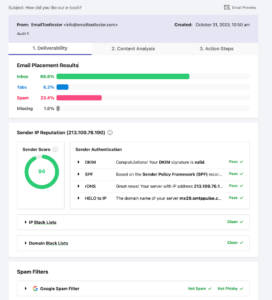Summary
The dynamic between email marketers and deliverability experts can sometimes be fraught with tension, leading to disagreements over seemingly fundamental advice. While experts base their recommendations on deep technical knowledge of mailbox provider algorithms, industry standards, and long-term sender reputation, marketers often operate under different pressures, focusing on immediate campaign performance, list growth, and perceived industry norms. This often creates a clash of perspectives where validated best practices are questioned or resisted. Understanding these underlying reasons can help bridge the gap and foster more productive collaborations.
Key findings
- Validation seeking: Clients often seek validation for their existing strategies, even if those are problematic, rather than embracing corrective advice.
- Misaligned goals: Marketers frequently prioritize immediate acquisition and list growth, which can conflict with an expert's focus on long-term sender health and engagement.
- Resistance to change: Businesses are often reluctant to abandon methods they perceive as working or have heavily invested in, even when these practices are detrimental to deliverability.
- Ignorance of technicalities: A lack of deep understanding of underlying email authentication (like DMARC, SPF, and DKIM) and mailbox provider algorithms can lead marketers to question restrictive advice.
- Perceived insult: Refusing to work with problematic list acquisition methods (e.g., purchased lists) can be interpreted as a personal slight by clients.
Key considerations
- Educate clients: Experts should prioritize educating clients about the principles of deliverability and the long-term impact of non-compliance.
- Set clear expectations: Clearly define the scope of deliverability advice and the necessary changes required for success from the outset.
- Focus on data: Present deliverability advice backed by data and case studies to demonstrate the real-world impact of best practices, such as how email deliverability works in practice.
- Address business objectives: Frame deliverability advice in terms of achieving sustainable marketing goals and return on investment, aligning with the client's business perspective.
- Acknowledge investment: Recognize that businesses have invested in their current strategies, and gently guide them towards better practices, highlighting the potential ROI of deliverability improvements. More information can be found on Only Influencers.
What email marketers say
Email marketers often face significant pressure to achieve high volume and reach, which can lead them to adopt strategies that clash with established deliverability best practices. Their opinions reveal a desire for simple solutions and a frustration with the perceived complexity or restrictiveness of expert advice. This is particularly true when advice challenges common, yet problematic, marketing tactics that they believe are working or have been used historically.
Key opinions
- Validation over advice: Many marketers primarily seek confirmation for their existing strategies, rather than guidance that might require a significant shift in their approach.
- Resistance to external authority: Some marketers are accustomed to dictating strategy internally and find it difficult to accept challenging opinions from external consultants, unlike their own staff.
- Everyone does it mentality: There's a common belief that certain problematic practices (like using third-party lists) are widespread and therefore acceptable, despite expert warnings about their impact on domain reputation.
- Acquisition methods are sacred: For some businesses, email acquisition is viewed as non-negotiable, leading them to prioritize list growth over the health of their deliverability.
- Distrust of consultants: A suspicion exists that consultants may not genuinely want to help, or are holding back secrets to deliverability, rather than providing straightforward advice.
- Cost vs. value perception: Marketers may be reluctant to invest in common sense guidelines, expecting a quick fix for delivering undesirable content successfully.
Key considerations
- Consequences of bad practices: Marketers need a clear understanding of the direct impact of using purchased lists on their sender reputation and inbox placement, leading to failed email delivery.
- Long-term perspective: Emphasize that short-term gains from aggressive tactics often lead to long-term deliverability problems and financial losses for the business.
- Ethical data collection: Highlight the importance of consent-based list building for sustainable and effective email marketing campaigns.
- Resource reallocation: Guide marketers on how to reallocate resources from problematic acquisition strategies to engagement and list hygiene for better inbox placement.
- Reputation impact: Stress that poor deliverability (due to bad practices) can damage overall brand reputation beyond just email, affecting customer trust and perception. More on why deliverability matters from Higher Logic.
Marketer view
Marketer from Email Geeks suggests that clients often approach consultants seeking validation for their current methods rather than genuine advice that might contradict their existing approach. They may have a pre-conceived notion of how email should work and simply want someone to agree with them, making them resistant to differing expert opinions. This behavior can lead to frustration when direct, corrective advice is given.
Marketer view
Marketer from Higher Logic emphasizes that improving segmentation is a key way to enhance overall email marketing effectiveness. From a marketer's perspective, this focuses on audience targeting and relevance as primary drivers of campaign success, which directly aligns with engagement metrics important for deliverability. By sending relevant content to segmented audiences, marketers can improve open and click rates.
What the experts say
Deliverability experts frequently experience frustration when their advice, rooted in technical understanding and industry best practices, is met with skepticism or outright argument. They operate on the principle that certain foundational elements, such as opt-in lists, engagement, and proper authentication, are non-negotiable for success. This perspective sometimes clashes directly with client expectations for quick fixes or validation of risky, non-compliant strategies, leading to significant friction in consultations.
Key opinions
- No compromise on opt-in: Experts firmly believe that effective deliverability is unattainable without legitimate, explicit opt-in methods for list acquisition.
- Clients seeking secrets: There is a common misconception that experts possess some hidden trick to successful email delivery, rather than relying on established best practices.
- Managing DMARC skepticism: Experts often encounter clients who are resistant to implementing critical protocols like DMARC, viewing it as unnecessary or an attempt to upsell.
- Dealing with misinformation: Experts frequently debunk common deliverability myths that are prevalent among marketers, which can create initial friction.
- Focus on long-term health: The primary focus for experts is always on sustainable, long-term sender reputation and inbox placement, even if it means sacrificing immediate, high-volume sending.
- Educating on algorithmic behavior: Experts stress that their advice is based on how mailbox providers actually work, which often contradicts anecdotal marketer experience.
Key considerations
- Clear communication: Experts must articulate the why behind their recommendations, clearly connecting technical advice to tangible business outcomes.
- Managing expectations: Proactively communicate that quick fixes for deep-seated deliverability issues are rare, and significant improvement requires consistent effort.
- Ethical boundaries: Be prepared to decline engagements where client practices fundamentally undermine deliverability principles, such as the use of purchased lists that lead to blacklisting.
- Demonstrate value: Show how adherence to best practices leads to better ROI and overall marketing success, not just compliance. More information can be found on SpamResource and Word to the Wise.
- Patience and persistence: Educating clients often requires repeated explanations and consistent reinforcement of core principles, especially when challenging long-held beliefs about email marketing.
Expert view
Expert from Email Geeks clarifies that an inability to assist clients using non-opt-in lists isn't an insult, but a pragmatic recognition that their services are ineffective without proper address collection. This highlights the foundational nature of consent in achieving deliverability. The expert emphasizes that their expertise relies on clients adhering to fundamental best practices to ensure messages reach the inbox.
Expert view
Expert from SpamResource aims to debunk common email deliverability myths, covering various aspects from data collection practices to email content and verification myths. This addresses the prevalent misinformation that often leads to arguments between marketers and deliverability experts. By clarifying these misconceptions, experts help bridge the knowledge gap and guide senders towards more effective strategies.
What the documentation says
Official documentation from major mailbox providers and industry standards bodies consistently emphasizes user consent, engagement, and adherence to technical authentication specifications like SPF, DKIM, and DMARC. These guidelines form the bedrock of deliverability best practices, providing a neutral, authoritative perspective that often contrasts sharply with speculative or anecdotal marketing advice, serving as a critical reference point for expert recommendations.
Key findings
- Consent is paramount: Mailbox providers prioritize explicit user consent for email reception, with unsolicited mail being heavily filtered and often leading to blacklisting.
- Authentication is essential: Strict adherence to authentication standards (SPF, DKIM, DMARC) is crucial for email to be recognized as legitimate and not spoofed.
- Engagement metrics matter: Mailbox providers use engagement signals (opens, clicks, replies, deletions, spam complaints) as key indicators to determine inbox placement.
- Reputation is cumulative: Sender reputation is built over time based on consistent, positive sending behavior and adherence to policies.
- Clear unsubscribe options: Documentation consistently stresses the necessity of easy-to-find and functional unsubscribe mechanisms to protect user experience.
Key considerations
- Interpretive challenge: Official documentation can be highly technical, making it difficult for non-experts to fully interpret and apply its implications without specialized knowledge.
- Dynamic policies: Mailbox provider algorithms and policies are constantly evolving, requiring continuous monitoring and adaptation beyond static documentation.
- Holistic approach: No single piece of documentation holds all the answers. A comprehensive understanding of various guidelines, like those found in Google Postmaster Tools, is necessary for effective deliverability.
- Penalties for non-compliance: Documentation often outlines the severe consequences of violating policies, including blocklisting, filtering, and impacting transactional emails. SendLayer provides further insight.
- User experience focus: The overarching goal of mailbox provider documentation is to protect user experience by minimizing unwanted mail and ensuring legitimate emails reach the inbox.
Technical article
Documentation from Google Postmaster Tools states that high spam rates will severely negatively impact a sender's reputation, leading to increased filtering and potential blocklisting for future mailings. This directly correlates poor sender behavior with adverse deliverability outcomes, emphasizing the critical role of maintaining a clean sending history to ensure messages reach the inbox and avoid spam folders.
Technical article
Documentation from RFC 5322 (Internet Message Format) specifies the standard for email message headers and bodies, ensuring interoperability across different mail systems. Adherence to these technical specifications is fundamental for basic email deliverability, as it allows mail servers to properly process and route messages. Without conforming to these standards, emails are likely to be rejected or misclassified.
Related resources
15 resources
Related pages
Why your emails fail: expert guide to improve email deliverability [2025]
How does email deliverability work in the current email marketing landscape?
How do email sending practices impact domain reputation and deliverability?
How to run an email deliverability test: a proven checklist
A simple guide to DMARC, SPF, and DKIM
Email deliverability issues: getting your messages to the inbox in 2025
Ultimate guide to Google Postmaster Tools V2
What is the division of email deliverability responsibility between ESPs and businesses?
What are the essential tools and practices for email deliverability?
Why your email deliverability rate is wrong: hidden factors most marketers miss















